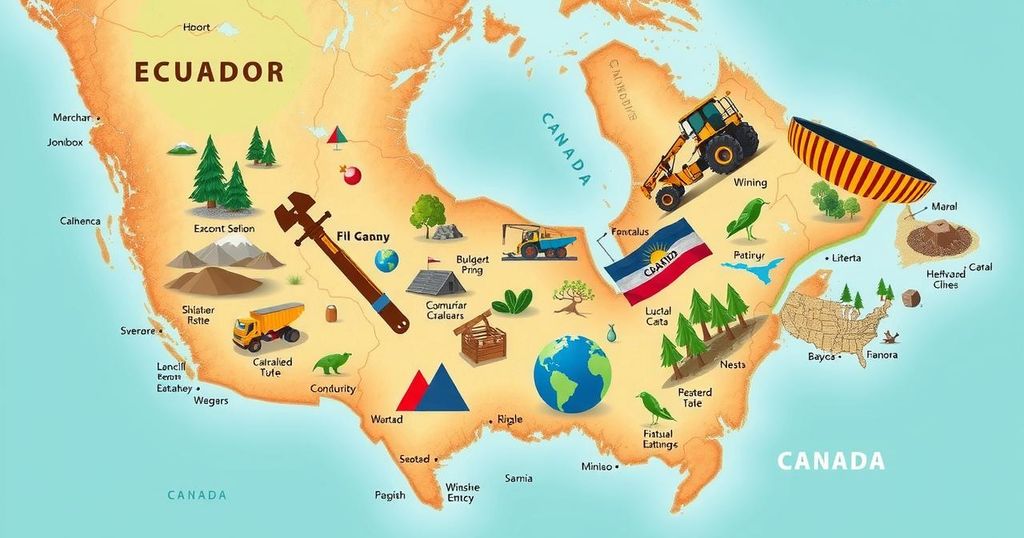Conflicts of Interest and Sovereignty at Stake: The Ecuador-Canada FTA

Ecuador’s President Daniel Noboa has finalized a Free Trade Agreement with Canada, amidst concerns about mining, environmental degradation, and conflicts of interest due to his family’s ties to Canadian mining. The deal may undermine Ecuador’s sovereignty through controversial investor protections, raising alarms among civil society. Critics argue that the FTA serves the Noboa family’s private interests while expanding foreign corporate power over resources.
Last month, Ecuador’s President Daniel Noboa announced the completion of a free trade agreement (FTA) with Canada following nearly a year’s negotiations. This agreement is presented as a mechanism for economic growth; however, there are serious concerns regarding its anticipated benefits to extractive industries, particularly mining. Civil society organizations in both nations caution that the agreement may lead to environmental degradation, human rights abuses, and conflicts with Ecuador’s constitutional framework.
A significant conflict of interest emerges for President Noboa, whose family has substantial investments in a Canadian mining company. The FTA includes contentious investor protections that are outlawed by Ecuador’s constitution, allowing foreign entities to sue the government via secret international tribunals. This raises issues regarding national sovereignty, democratic governance, and the welfare of the public.
The Noboa family’s involvement with Canadian mining began in 2019, when Nobis, owned by President Noboa’s aunt, acquired a 10 percent stake in Adventus Mining Corporation. Following this investment of $5.5 million, Nobis became the largest Ecuadorian investor in Adventus, which holds significant interests in one of the country’s upcoming major mining projects. With key executives from Nobis placed in Adventus leadership, the family consolidated power within the mining sector.
After President Noboa’s inauguration in January 2024, Adventus expanded its portfolio by acquiring Luminex Resources. Despite local opposition, the Noboa administration granted an environmental license for the Domo project in the same month, not disclosing Noboa’s family’s involvement. Notably, the administration abolished nepotism restrictions and Noboa addressed influential mining conferences, marking the initiation of FTA discussions with Canada.
The deal subsequently prompted concerns after several human rights advocates opposing the Domo environmental approval received prison sentences. Subsequently, Adventus secured a significant merger with Silvercorp, resulting in a financial windfall for the Noboa family, as their original investment appreciated significantly following governmental backing.
Nonetheless, community objections persisted, leading to legal challenges against the environmental license. The court upheld the license while the government approved project advancement, highlighting the Noboa family’s extensive influence over Ecuador’s mining sector amid ongoing public dissent.
The FTA under review is not merely a push for mining development but poses potential risks of corporate encroachment, with protective measures for familial investments. The investor-state dispute settlement (ISDS) mechanism could allow Silvercorp, reflective of the Noboa family’s interests, to litigate against Ecuadorian policies if perceived as detrimental.
Historically, Ecuador has suffered losses due to ISDS mechanisms, particularly exemplified by the Copper Mesa case, where the government was compelled to pay substantial damages despite grievances of wrongdoing. Consequently, the public remains wary of reintegrating into ISDS frameworks, with a recent referendum decisively favoring the prohibition of such agreements.
Nevertheless, the current administration has signaled intentions to re-enter ISDS arrangements, facilitating corporate access to legal mechanisms that favor private interests. As Canadian investments largely dominate Ecuador’s mining sector, concerns abound regarding the FTA nurturing a landscape conducive to ISDS exploitation.
Ecuadorians and Canadians must critically evaluate the implications of this FTA. The agreement seems poised to enhance the Noboa family’s interests while granting Canadian corporations increased leverage in exploiting Ecuador’s resources, raising questions about environmental sustainability and local welfare. Instead of fostering equitable prosperity, this trade deal risks undermining Ecuador’s sovereignty and potentially damaging Canada’s global stature.
The Ecuador-Canada Free Trade Agreement raises significant concerns regarding conflicts of interest, particularly involving President Noboa and his family’s mining investments. While aimed at boosting economic growth, the deal risks environmental degradation and human rights violations, challenging national sovereignty through controversial investor protections. Citizens of both nations must be vigilant and consider who truly benefits from this agreement, which appears to prioritize corporate interests over public welfare. Ultimately, the FTA may foster unequal resource exploitation, harm local communities, and jeopardize Ecuador’s autonomy.
Original Source: cepr.net








